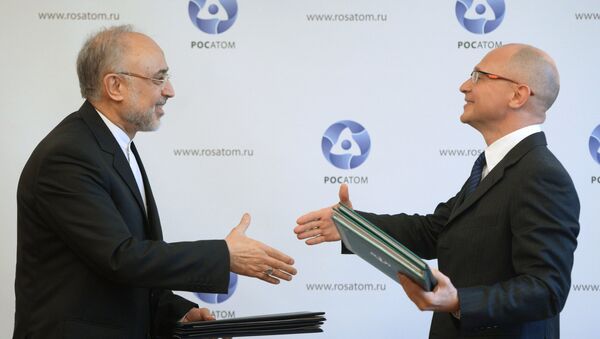MOSCOW, November 21 (Sputnik) — Tehran should take into account its recent nuclear agreements with Moscow when determining the country's energy needs as Russia has proven that it can be relied on, Swedish diplomat and former head of the International Atomic Energy Agency (IAEA) Hans Blix told Sputnik News Agency on Friday.
“I don’t know what they are saying in the [Iran-P5+1] talks, because I am not in the talks, but I do think that the recent agreement with Russia about the contract on two nuclear power reactors and in addition to that the delivery of fuel should be taken into account by Iran when they calculate what needs they have for the future. This ought to be positive,” Blix said.
Despite European calls to minimize energy dependence on Russia, the country has proven itself to be a reliable supplier and Iran can trust Russia when it comes to the provision of nuclear fuel, Blix stated.
“I think Russia has been in the past a reliable supplier and I think that it should be possible for Iran to rely upon taking them into account. So this is a new important element, in my idea, and a hopeful one,” he told Sputnik News Agency.
However, he noted that "at the same time, it also imposes important duties on Russia to actually deliver.”
Last week, Moscow and Tehran signed a number of cooperation agreements on the construction of two nuclear reactors in Iran, possibly followed by six more, using Russian technology. Nuclear fuel for the units will be provided by Russia, with the spent fuel rods being returned to Russia.
Russian nuclear agency Rosatom has stated that the construction, as well as fuel and equipment deliveries will guaranteed by the IAEA and in compliance with the Treaty on the Non-Proliferation of Nuclear Weapons (NPT).
Iran's nuclear program is considered to be controversial by many countries, despite its repeated claims that the program is peaceful in nature and aimed purely at meeting civilian needs. The West suspects Iran of developing a nuclear weapon under the guise of a peaceful program and the country is currently subject to sanctions passed by the UN Security Council, the European Union, United States and a number of other countries.
The final round of nuclear talks between Iran and the P5+1 group, comprising Russia, United States, United Kingdom, France, China and Germany, began in Vienna on Tuesday. The negotiations are aimed at reaching an agreement with the Islamic Republic on its nuclear program by November 24.

